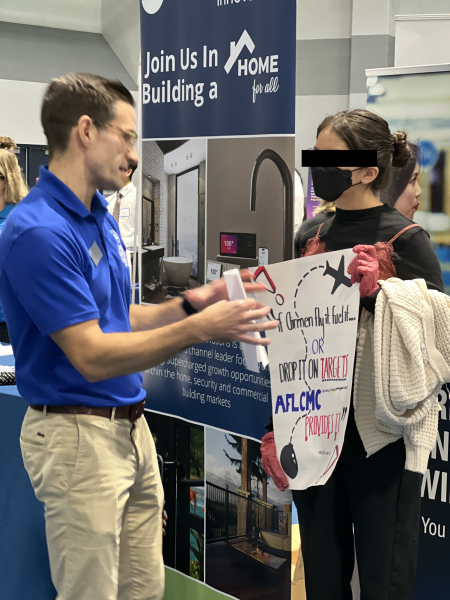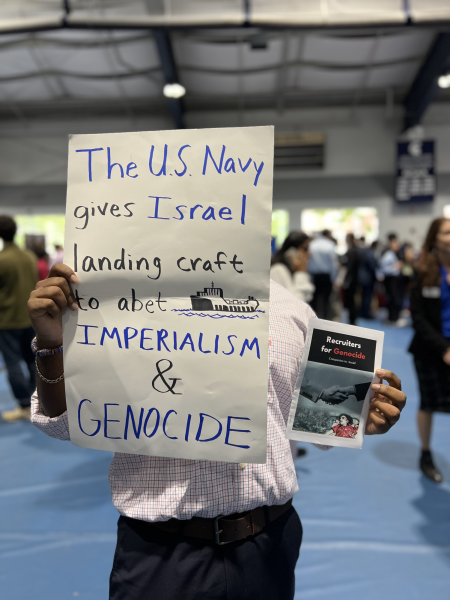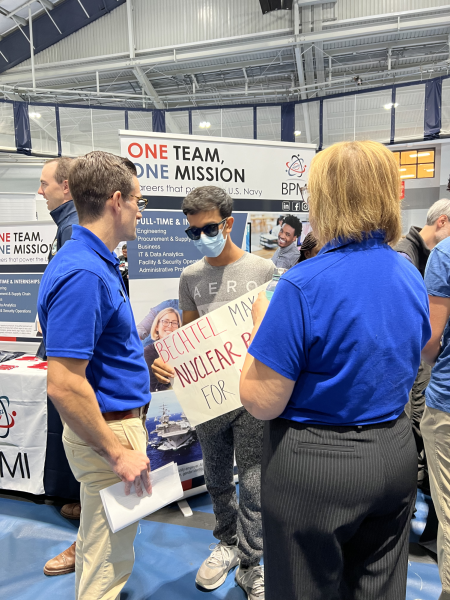On Sept. 26, Case Western Reserve University held its annual Career Fair in the Veale Convocation, Recreation and Athletic Center, where students have the opportunity to speak with representatives from various companies. This year, over 1,750 students attended, making it the most-attended career fair in CWRU’s history.

While the start of the fair went as planned, around 11:30 a.m., a group of roughly 10 students stood at various tables holding signs and handing out small pamphlets. The signs accused the specific companies of being complicit in various actions taken by the State of Israel during the Israel-Hamas war.
“Our goal here today is just to get people to pause and think about the companies that they’re working for and the way that these companies invest in the deaths of innocent civilians, both throughout the world, but especially right now, with the ongoing crisis in the Middle East,” one of the protest participants said.
Another protester said, “A lot of people think that the genocide in Gaza, in Congo, in Haiti—it starts and begins with the military. Even though I’m here against the military, all these different corporations and industries, from Lockheed Martin to Boeing, play a role in it, from fueling and abetting. Even our university, right?”
Relating it back to CWRU, this participant said, “President Kaler has taken our money, our tuition, all of our dollars, and sent it to feed the military industrial complex, which is allowing our country to continue terrorism abroad in every corner of the earth, from Asia to Africa to South America and even here domestically, right?”
Students who attended the Career Fair generally had neutral reactions. One onlooker said, “I think the protesters at the Career Fair are a fair representation of people’s voices. However, it does add difficulty and levels of uncomfortableness to individuals seeking jobs in those careers, and defense has always been part of our society. I don’t disagree with the voices that are being spoken but there’s something to be said for both sides.”

Another onlooker said, “I think they [have] the right to protest, and I think they’re doing it in the right way. They’re not really disturbing any conversations. I think they’re doing it the right way, and I respect the courage that they have to protest, and I’m pretty sure that for more than one student, their feedback is actually useful.”
Around noon, protesters were asked by Assistant Vice President for Careers and Corporate Engagement Drew Poppleton, Associate Director of Employer Relations Laura Papcum and other staff from the Career Center to move to a central location in Veale, not near the companies’ recruiting tables.
“The protest that occurred at the Career Fair was not approved by the university’s Freedom of Expression Policy Committee. In line with the university’s Freedom of Expression Policy Procedures and Operating Rules, individuals were asked to disperse,” the university said in response to the demonstration.
The day before the Career Fair, the CWRU chapter of Students for Justice in Palestine posted twice on their Instagram account, pointing out eight companies at the fair for students to avoid, three of which were a direct part of the U.S. military. Their list includes Henkel, Eaton, Ametek, Bechtel and KeyBank, with KeyBank being a “Spartan Sponsor” of the Career Fair.

After the fair, four student groups—Sunrise CWRU, the CWRU Chapter of the Ohio Student Association, the Student Sustainability Council and the Western Reserve Abolitionist Project—posted a series of photos of the protestors holding up signs near company tables. The post linked to a series of demands. One of these documents was an “Overviews and Demands” which listed seven demands.
The last point demands the Career Center “to formally ban” 10 organizations, including those already mentioned in the previous Instagram post. The document argues that CWRU enables the “military industrial complex … materially through elaborate alumni networks” and also that the goal of CWRU is now centered “toward industry-set standards of efficiency; it diminishes both our capacity for critical thought and our ability to engage in and sustain community.” The end of the first point reads, “It is within this context that mega-corporations, military contractors, and CWRU university administrators groom students to support the U.S. military-industrial complex.”
In an additional document, the student groups list 20 organizations with certain “talking points” that promote their relationship with a variety of causes.
One of the student participants noted the goal for this list is to “educate people about which companies here are in some way complicit.” They said, “We’ve done a lot of research about these companies. This is not even a super exhaustive list, but these are kind of the top 15, and they’re ordered in order of involvement.”




